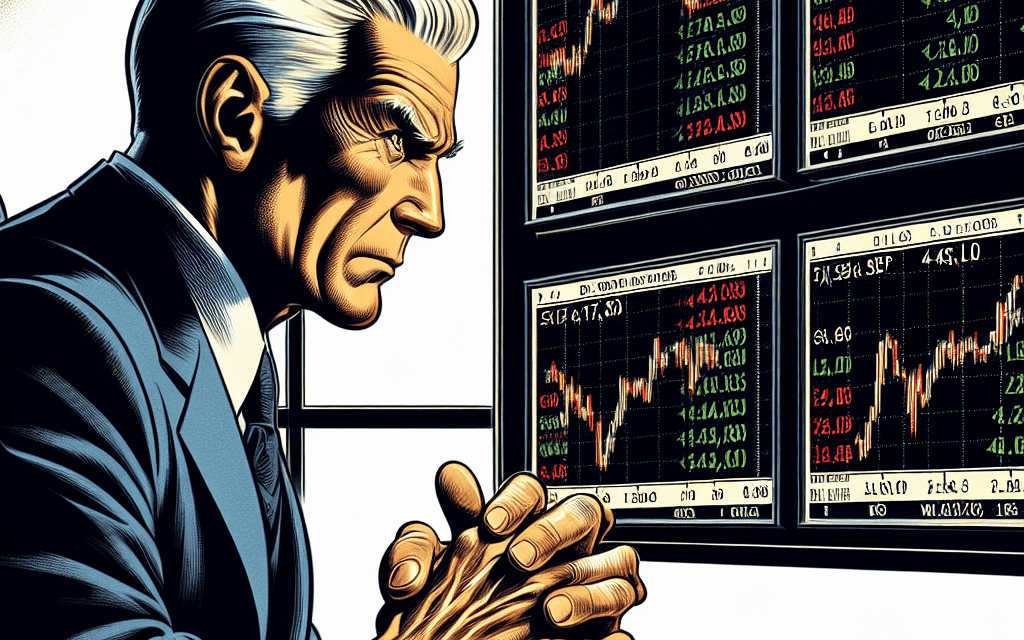“Amidst Caution, Buffett Bets on Resilience: 4 Stocks Defying Wall Street’s Worries”
Introduction
Warren Buffett, the legendary investor and CEO of Berkshire Hathaway, has long been a beacon of financial wisdom on Wall Street. Despite his recent cautionary stance, underscored by a staggering $132 billion in cash reserves, Buffett remains committed to strategic investments in a select group of resilient stocks. This approach highlights his enduring confidence in certain sectors and companies, even amidst market volatility and economic uncertainty. By focusing on these four robust stocks, Buffett demonstrates his belief in their long-term potential and ability to weather financial storms, offering valuable insights into his investment philosophy and the principles that guide his decisions.
Understanding Warren Buffett’s Investment Strategy Amidst Market Caution
Warren Buffett, the legendary investor and CEO of Berkshire Hathaway, has long been a beacon of wisdom for Wall Street. His cautious approach, underscored by a staggering $132 billion cash reserve, signals a wariness towards the current market conditions. This substantial cash pile suggests that Buffett is preparing for potential market downturns, waiting for the right opportunities to deploy capital when valuations become more attractive. Despite this caution, Buffett continues to invest in a select group of resilient stocks, demonstrating his confidence in their long-term potential. Understanding his investment strategy amidst this caution provides valuable insights into his approach to navigating uncertain markets.
Buffett’s investment philosophy is rooted in value investing, a strategy that involves picking stocks that appear to be undervalued by the market. This approach requires a deep understanding of a company’s intrinsic value, which is often determined by its fundamentals, such as earnings, dividends, and growth potential. In times of market volatility, Buffett’s strategy emphasizes patience and discipline, focusing on companies with strong competitive advantages, robust financial health, and capable management teams. This focus on quality over quantity is evident in his continued investment in four resilient stocks, which he believes will withstand economic fluctuations and deliver long-term returns.
One of the key stocks in Buffett’s portfolio is Apple Inc., a company that has consistently demonstrated its ability to innovate and maintain a loyal customer base. Apple’s strong brand, coupled with its ecosystem of products and services, provides a competitive moat that aligns with Buffett’s investment criteria. Despite market uncertainties, Apple’s consistent revenue growth and substantial cash flow make it a cornerstone of Berkshire Hathaway’s holdings. This investment reflects Buffett’s belief in the enduring value of companies that can adapt to changing consumer preferences while maintaining operational excellence.
Another resilient stock that Buffett continues to invest in is Coca-Cola. Known for its iconic brand and global reach, Coca-Cola represents a classic example of a company with a durable competitive advantage. The beverage giant’s ability to generate steady cash flow, even during economic downturns, underscores its resilience. Buffett’s long-standing investment in Coca-Cola highlights his preference for companies with strong brand recognition and a proven track record of profitability. This investment serves as a testament to his confidence in the company’s ability to navigate market challenges and deliver consistent returns.
In addition to Apple and Coca-Cola, Buffett has shown a continued interest in the financial sector, particularly through his investment in Bank of America. The bank’s strong capital position and diversified business model make it a compelling choice for Buffett, who values financial institutions with prudent risk management practices. Bank of America’s focus on digital transformation and cost efficiency aligns with Buffett’s investment philosophy, as it positions the bank for sustainable growth in an evolving financial landscape. This investment reflects Buffett’s belief in the resilience of well-managed financial institutions, even amidst economic uncertainties.
Lastly, Buffett’s investment in American Express underscores his confidence in the financial services sector. American Express’s strong brand loyalty and premium customer base provide a competitive edge that resonates with Buffett’s investment principles. The company’s ability to generate consistent revenue through its diversified business model and focus on customer engagement aligns with Buffett’s long-term investment strategy. This investment highlights his belief in the enduring value of companies that prioritize customer satisfaction and operational efficiency.
In conclusion, Warren Buffett’s cautious stance towards the broader market does not preclude him from investing in companies that exhibit resilience and long-term growth potential. His continued investment in Apple, Coca-Cola, Bank of America, and American Express reflects his confidence in their ability to weather economic uncertainties and deliver sustainable returns. By focusing on companies with strong fundamentals and competitive advantages, Buffett’s investment strategy offers valuable lessons for navigating market volatility while maintaining a long-term perspective.
Analyzing the Resilience of Buffett’s Top Stock Picks
Warren Buffett, the legendary investor and CEO of Berkshire Hathaway, has long been a beacon of wisdom on Wall Street. His cautious approach, underscored by a staggering $132 billion in cash reserves, signals his wariness of current market conditions. Despite this caution, Buffett continues to invest in a select group of resilient stocks, demonstrating his confidence in their long-term potential. This strategic choice reflects his investment philosophy, which prioritizes intrinsic value and sustainable growth over short-term market fluctuations.
One of the cornerstones of Buffett’s portfolio is Apple Inc., a company that has consistently demonstrated resilience in the face of economic uncertainty. Apple’s robust ecosystem, characterized by its innovative products and services, has created a loyal customer base that drives consistent revenue streams. Furthermore, Apple’s strong balance sheet and substantial cash reserves provide a buffer against market volatility, making it an attractive investment for Buffett. The company’s ability to adapt to changing consumer preferences and technological advancements further solidifies its position as a resilient stock in Buffett’s portfolio.
In addition to Apple, Buffett has shown unwavering confidence in the financial sector, particularly through his investment in Bank of America. This banking giant has weathered numerous economic storms, thanks to its diversified revenue streams and prudent risk management practices. Bank of America’s focus on digital transformation and cost efficiency has enhanced its competitive edge, allowing it to navigate the challenges posed by low interest rates and regulatory pressures. Buffett’s investment in Bank of America underscores his belief in the resilience of well-managed financial institutions, even amid economic headwinds.
Another resilient stock that Buffett continues to back is Coca-Cola, a company synonymous with global brand recognition and market dominance. Coca-Cola’s extensive distribution network and diverse product portfolio have enabled it to maintain a strong market presence, even in challenging economic environments. The company’s strategic focus on expanding its beverage offerings and investing in sustainable practices aligns with evolving consumer preferences, ensuring its continued relevance in the global market. Buffett’s long-standing investment in Coca-Cola highlights his confidence in the enduring appeal of iconic brands with a proven track record of adaptability and growth.
Lastly, Buffett’s investment in American Express reflects his belief in the resilience of companies with strong brand loyalty and a focus on customer-centric innovation. American Express has consistently demonstrated its ability to adapt to changing consumer behaviors and technological advancements, positioning itself as a leader in the financial services industry. The company’s emphasis on premium customer experiences and strategic partnerships has bolstered its competitive advantage, allowing it to thrive in a rapidly evolving market landscape. Buffett’s continued support for American Express underscores his conviction in the long-term potential of companies that prioritize customer satisfaction and innovation.
In conclusion, Warren Buffett’s investment strategy, characterized by caution and selectivity, highlights his focus on resilient stocks with strong fundamentals and growth potential. Despite his substantial cash reserves, Buffett’s continued investment in Apple, Bank of America, Coca-Cola, and American Express reflects his confidence in their ability to withstand economic uncertainties and deliver sustainable returns. By prioritizing companies with robust business models and a proven track record of adaptability, Buffett exemplifies the importance of resilience in navigating the complexities of the modern financial landscape.
How Buffett Balances Caution and Opportunity in Today’s Market
In the ever-evolving landscape of financial markets, Warren Buffett, the Oracle of Omaha, remains a beacon of wisdom and prudence. His recent cautionary stance, underscored by a staggering $132 billion in cash reserves, has sent ripples through Wall Street, signaling a period of uncertainty and potential volatility. Despite this cautious approach, Buffett continues to demonstrate his unwavering belief in the resilience of certain stocks, showcasing his ability to balance caution with opportunity. This dual strategy is emblematic of his investment philosophy, which emphasizes long-term value over short-term gains.
Buffett’s decision to hold such a significant cash reserve is not without reason. It reflects his anticipation of potential market corrections and his readiness to capitalize on opportunities that may arise during periods of economic downturn. This cautious approach is a testament to his understanding of market cycles and his commitment to safeguarding Berkshire Hathaway’s capital. However, even amidst this caution, Buffett’s investment portfolio reveals a strategic focus on companies that exhibit robust fundamentals and the capacity to weather economic storms.
One of the cornerstones of Buffett’s resilient stock picks is Apple Inc. His substantial investment in the tech giant underscores his confidence in its enduring brand strength and innovative prowess. Apple’s ability to consistently deliver cutting-edge products and maintain a loyal customer base aligns with Buffett’s preference for companies with a durable competitive advantage. Furthermore, Apple’s strong financial position and consistent revenue growth provide a buffer against market volatility, making it a quintessential Buffett investment.
In addition to Apple, Buffett’s portfolio includes significant stakes in Bank of America. This investment highlights his belief in the resilience of the financial sector, particularly in institutions with strong balance sheets and prudent management. Bank of America’s focus on digital transformation and cost efficiency positions it well to navigate the challenges of a rapidly changing financial landscape. Buffett’s confidence in the bank’s ability to generate sustainable returns is evident in his continued investment, despite broader economic uncertainties.
Another resilient stock in Buffett’s portfolio is Coca-Cola, a company synonymous with global brand recognition and consumer loyalty. Coca-Cola’s extensive distribution network and diverse product offerings provide a stable revenue stream, even in challenging economic conditions. Buffett’s long-standing investment in Coca-Cola reflects his appreciation for companies with a timeless appeal and the ability to adapt to shifting consumer preferences. This investment serves as a reminder of Buffett’s penchant for businesses that combine tradition with innovation.
Lastly, Buffett’s investment in American Express showcases his belief in the enduring value of financial services companies with a strong brand and customer loyalty. American Express’s focus on premium customers and its ability to adapt to changing payment trends make it a resilient choice in Buffett’s portfolio. The company’s strategic initiatives to expand its digital offerings and enhance customer experiences align with Buffett’s investment criteria of sustainable growth and competitive advantage.
In conclusion, Warren Buffett’s approach to balancing caution and opportunity in today’s market is a masterclass in strategic investing. While his substantial cash reserves signal a readiness for potential market corrections, his continued investment in resilient stocks like Apple, Bank of America, Coca-Cola, and American Express demonstrates his confidence in their long-term value. This dual strategy not only reflects Buffett’s deep understanding of market dynamics but also his unwavering commitment to investing in companies with enduring strengths. As Wall Street navigates uncertain waters, Buffett’s investment philosophy serves as a guiding light for those seeking to balance caution with opportunity.
The Role of Resilient Stocks in Buffett’s Portfolio

Warren Buffett, the legendary investor and CEO of Berkshire Hathaway, has long been a beacon of wisdom on Wall Street. His cautious approach, underscored by a staggering $132 billion in cash reserves, signals his wariness of the current market conditions. Despite this caution, Buffett continues to invest in a select group of resilient stocks, demonstrating his belief in their enduring value and potential for long-term growth. This strategy highlights the critical role that resilient stocks play in his portfolio, offering stability and growth even amidst market volatility.
Resilient stocks, by their very nature, are those that can withstand economic downturns and emerge stronger. They typically belong to companies with robust business models, strong balance sheets, and a proven track record of performance. Buffett’s investment philosophy has always centered around the idea of buying quality businesses at fair prices and holding them for the long term. This approach is evident in his continued investment in four key stocks: Apple, Coca-Cola, American Express, and Bank of America.
Apple, a technology giant, represents a significant portion of Buffett’s portfolio. Despite the tech sector’s inherent volatility, Apple has consistently demonstrated resilience through its innovative product offerings and strong brand loyalty. The company’s ability to generate substantial cash flow and maintain a healthy balance sheet aligns with Buffett’s investment criteria. Moreover, Apple’s commitment to returning value to shareholders through dividends and share buybacks further solidifies its position as a resilient stock in Buffett’s eyes.
Similarly, Coca-Cola has been a staple in Buffett’s portfolio for decades. The beverage giant’s global brand recognition and extensive distribution network provide a competitive edge that is difficult to replicate. Even in challenging economic times, Coca-Cola’s products remain in demand, underscoring the company’s resilience. Buffett’s long-standing confidence in Coca-Cola is a testament to the enduring appeal of consumer staples, which tend to perform well regardless of economic conditions.
American Express, another cornerstone of Buffett’s investments, exemplifies resilience through its strong brand and customer loyalty. The financial services company has weathered numerous economic cycles, consistently adapting to changing market dynamics. Its focus on premium customers and strategic partnerships has enabled American Express to maintain a competitive position in the industry. Buffett’s continued investment in American Express reflects his belief in the company’s ability to navigate economic uncertainties while delivering long-term value.
Bank of America, a leading financial institution, rounds out the quartet of resilient stocks in Buffett’s portfolio. The bank’s strong capital position and diversified business model have allowed it to withstand economic fluctuations and regulatory challenges. Buffett’s investment in Bank of America underscores his confidence in the resilience of well-managed financial institutions, particularly those with a focus on prudent risk management and sustainable growth.
In conclusion, Warren Buffett’s investment in these four resilient stocks highlights the importance of stability and long-term growth potential in his portfolio. Despite his cautious stance on the broader market, Buffett’s continued commitment to these companies reflects his belief in their ability to thrive amidst uncertainty. By focusing on resilient stocks, Buffett not only safeguards his investments against market volatility but also positions himself to capitalize on future opportunities. This strategy serves as a valuable lesson for investors seeking to navigate the complexities of today’s financial landscape.
Lessons from Buffett’s Investment Choices During Economic Uncertainty
In the ever-fluctuating world of finance, few figures command as much respect and attention as Warren Buffett. Known for his astute investment strategies and long-term vision, Buffett has consistently demonstrated an ability to navigate economic uncertainties with remarkable success. Recently, his decision to hold a staggering $132 billion in cash has raised eyebrows on Wall Street, signaling a cautious approach amid volatile market conditions. However, despite this conservative stance, Buffett continues to invest in a select group of resilient stocks, offering valuable lessons for investors seeking stability in uncertain times.
One of the key takeaways from Buffett’s investment strategy is the importance of focusing on companies with strong fundamentals. In times of economic uncertainty, businesses with solid financial health and a proven track record of performance are more likely to weather the storm. For instance, Buffett’s continued investment in Apple Inc. underscores his confidence in the tech giant’s ability to maintain its market leadership. Apple’s robust ecosystem, loyal customer base, and consistent innovation make it a formidable player in the technology sector, providing a buffer against economic downturns.
Moreover, Buffett’s investment in Coca-Cola highlights the significance of investing in companies with enduring brand value. Coca-Cola’s global presence and iconic status have allowed it to remain resilient even during challenging economic periods. The company’s ability to adapt to changing consumer preferences while maintaining its core brand identity exemplifies the kind of stability that Buffett seeks in his investments. This approach serves as a reminder that companies with strong brand recognition and customer loyalty are often better positioned to withstand economic headwinds.
In addition to focusing on strong fundamentals and brand value, Buffett’s investment choices also emphasize the importance of diversification. By investing in a range of industries, Buffett mitigates risk and ensures a balanced portfolio. His stake in American Express, for example, reflects his belief in the financial services sector’s potential for growth and resilience. American Express’s focus on premium customers and its ability to adapt to evolving payment trends have contributed to its enduring success, making it a valuable component of Buffett’s diversified investment strategy.
Furthermore, Buffett’s investment in Berkshire Hathaway itself serves as a testament to his confidence in the conglomerate’s ability to thrive in various economic conditions. As the chairman and CEO of Berkshire Hathaway, Buffett has built a diverse portfolio of businesses spanning multiple industries, from insurance to energy. This diversification not only provides stability but also allows the company to capitalize on opportunities across different sectors. Investors can learn from this approach by considering the benefits of diversification in their own portfolios, reducing exposure to any single industry or market.
In conclusion, Warren Buffett’s investment choices during times of economic uncertainty offer valuable insights for investors seeking to navigate volatile markets. By focusing on companies with strong fundamentals, enduring brand value, and diversification across industries, Buffett demonstrates a strategic approach that prioritizes stability and long-term growth. While his $132 billion cash reserve reflects caution, his continued investment in resilient stocks underscores his belief in the enduring potential of these companies. As investors look to emulate Buffett’s success, they would do well to heed these lessons, ensuring their portfolios are well-positioned to withstand the challenges of an ever-changing economic landscape.
The Impact of Buffett’s Cautious Approach on Wall Street
Warren Buffett, the legendary investor and CEO of Berkshire Hathaway, has long been a figure of immense influence on Wall Street. His investment decisions are closely scrutinized by analysts and investors alike, often serving as a barometer for broader market sentiment. Recently, Buffett’s cautious stance, underscored by Berkshire Hathaway’s substantial cash reserves of $132 billion, has sent ripples through the financial world. This significant cash pile is a testament to Buffett’s wariness of current market valuations and economic uncertainties. However, despite this caution, Buffett continues to invest in a select group of resilient stocks, demonstrating his enduring belief in their long-term potential.
Buffett’s cautious approach is not without reason. The global economic landscape is fraught with challenges, including geopolitical tensions, inflationary pressures, and the lingering effects of the COVID-19 pandemic. These factors contribute to an environment of heightened volatility and uncertainty, prompting many investors to adopt a more conservative stance. By maintaining a large cash reserve, Buffett positions Berkshire Hathaway to capitalize on potential opportunities that may arise from market dislocations. This strategy reflects his well-known investment philosophy of being “fearful when others are greedy and greedy when others are fearful.”
Despite his overall caution, Buffett’s continued investment in certain stocks highlights his confidence in their resilience and ability to weather economic storms. Among these are Apple, Coca-Cola, American Express, and Bank of America. Each of these companies possesses unique attributes that align with Buffett’s investment criteria, such as strong brand recognition, robust financial health, and a proven track record of profitability.
Apple, for instance, remains a cornerstone of Berkshire Hathaway’s portfolio. The tech giant’s innovative prowess and loyal customer base provide a competitive edge that is difficult to replicate. Moreover, Apple’s consistent revenue growth and substantial cash flow generation make it an attractive investment even in uncertain times. Similarly, Coca-Cola’s global brand recognition and extensive distribution network ensure its products remain in demand, regardless of economic conditions. This enduring appeal is a key reason why Buffett has maintained a stake in the beverage company for decades.
American Express and Bank of America also exemplify the qualities Buffett seeks in his investments. American Express benefits from a strong brand and a loyal customer base, while its focus on premium cardholders provides a buffer against economic downturns. Meanwhile, Bank of America, as one of the largest financial institutions in the United States, is well-positioned to benefit from rising interest rates, which can enhance its profitability. Both companies have demonstrated resilience in past economic cycles, reinforcing Buffett’s confidence in their long-term prospects.
In conclusion, while Warren Buffett’s $132 billion cash reserve signals a cautious approach to the current market environment, his continued investment in Apple, Coca-Cola, American Express, and Bank of America underscores his belief in their enduring value. These companies, with their strong fundamentals and competitive advantages, align with Buffett’s investment philosophy and offer a measure of stability amid market volatility. As Wall Street navigates an uncertain future, Buffett’s strategic decisions serve as a reminder of the importance of patience, prudence, and a focus on long-term value.
Exploring the Long-Term Potential of Buffett’s Resilient Investments
Warren Buffett, the legendary investor and CEO of Berkshire Hathaway, has long been a beacon of wisdom for Wall Street and individual investors alike. His cautious approach, underscored by a staggering $132 billion in cash reserves, signals a wariness of current market conditions. Despite this caution, Buffett continues to invest in a select group of resilient stocks, demonstrating his belief in their long-term potential. This strategic choice reflects his investment philosophy, which prioritizes intrinsic value and sustainable growth over short-term market fluctuations.
One of the key stocks in Buffett’s portfolio is Apple Inc., a company that has consistently demonstrated its ability to innovate and maintain a strong market presence. Apple’s robust ecosystem, characterized by its seamless integration of hardware, software, and services, has created a loyal customer base and a steady stream of revenue. Furthermore, the company’s commitment to research and development ensures that it remains at the forefront of technological advancements. This focus on innovation, coupled with a strong brand identity, makes Apple a resilient investment in Buffett’s eyes, capable of weathering economic uncertainties.
In addition to Apple, Buffett has shown confidence in the financial sector, particularly through his investment in Bank of America. The bank’s strong capital position and prudent risk management practices have enabled it to navigate economic downturns effectively. Moreover, Bank of America’s focus on digital transformation and customer-centric services has positioned it well for future growth. By investing in a financial institution with a solid foundation and a forward-looking strategy, Buffett underscores his belief in the sector’s resilience and potential for long-term profitability.
Another cornerstone of Buffett’s resilient investment strategy is his stake in Coca-Cola, a company synonymous with global brand recognition and consumer loyalty. Despite the challenges posed by shifting consumer preferences and health-conscious trends, Coca-Cola has successfully diversified its product offerings to include a range of beverages that cater to evolving tastes. This adaptability, combined with its extensive distribution network, ensures that Coca-Cola remains a dominant player in the beverage industry. Buffett’s continued investment in Coca-Cola highlights his confidence in the company’s ability to sustain its market leadership and deliver consistent returns.
Lastly, Buffett’s investment in American Express reflects his belief in the enduring value of financial services companies with strong brand equity and customer loyalty. American Express has carved out a niche in the premium credit card market, offering exclusive benefits and services that appeal to affluent consumers. This focus on high-value customers, along with strategic partnerships and a robust rewards program, has enabled American Express to maintain a competitive edge. By investing in a company with a proven track record of resilience and adaptability, Buffett reinforces his commitment to long-term value creation.
In conclusion, Warren Buffett’s investment strategy, characterized by caution and selectivity, underscores his belief in the enduring potential of certain resilient stocks. By focusing on companies with strong fundamentals, innovative capabilities, and the ability to adapt to changing market conditions, Buffett demonstrates his commitment to long-term value creation. Despite holding significant cash reserves as a buffer against market volatility, his continued investment in Apple, Bank of America, Coca-Cola, and American Express reflects a strategic approach that prioritizes sustainable growth and intrinsic value. As investors navigate an uncertain economic landscape, Buffett’s investment choices offer valuable insights into the principles of resilience and long-term potential.
Q&A
1. **What is Warren Buffett’s current cash reserve?**
Warren Buffett’s cash reserve is approximately $132 billion.
2. **Why is Warren Buffett cautious about Wall Street?**
Buffett is cautious due to market volatility and economic uncertainties.
3. **Which sectors do the resilient stocks belong to?**
The resilient stocks belong to sectors like technology, consumer goods, finance, and healthcare.
4. **Name one of the resilient stocks Warren Buffett continues to invest in.**
One of the resilient stocks is Apple Inc.
5. **What is a key characteristic of the stocks Buffett invests in?**
A key characteristic is their strong business fundamentals and ability to withstand economic downturns.
6. **How does Buffett’s investment strategy reflect his market outlook?**
His strategy reflects a focus on long-term value and resilience despite short-term market fluctuations.
7. **What is the significance of Buffett’s investment choices for other investors?**
His choices highlight the importance of investing in companies with solid fundamentals and growth potential.
Conclusion
Despite Warren Buffett’s cautious stance with a $132 billion cash reserve, signaling wariness towards the broader market, he continues to invest in four resilient stocks. This strategy underscores his confidence in these companies’ long-term potential and stability, even amid market uncertainties. Buffett’s selective investment approach highlights his focus on businesses with strong fundamentals, competitive advantages, and the ability to withstand economic fluctuations, reinforcing his reputation for prudent and strategic capital allocation.





